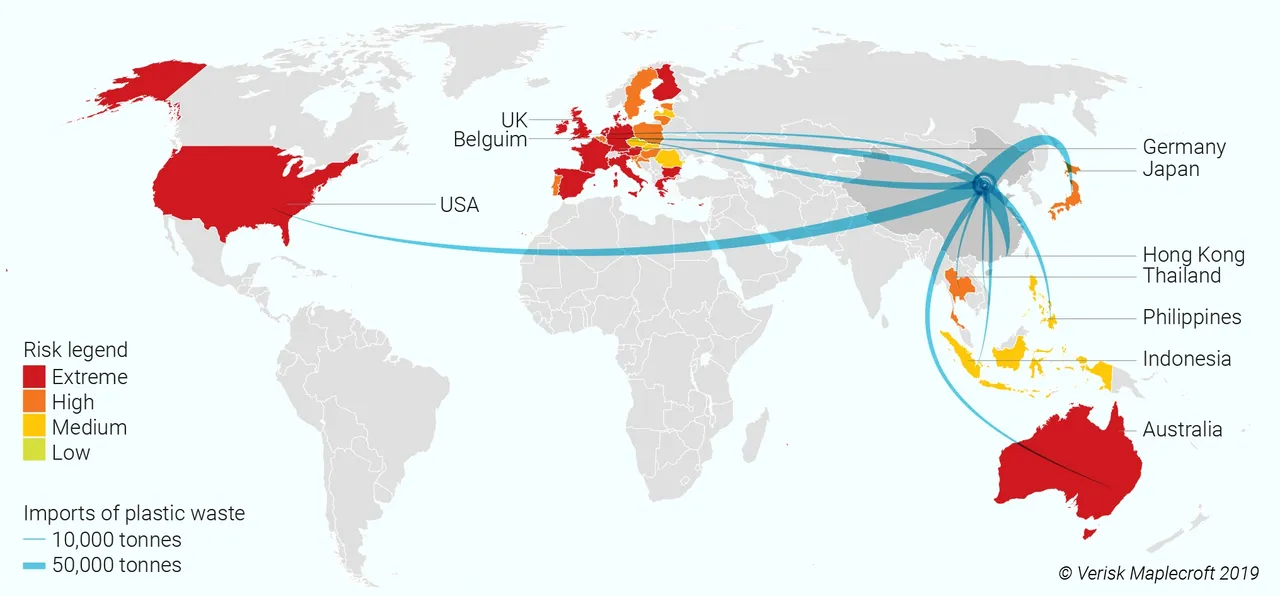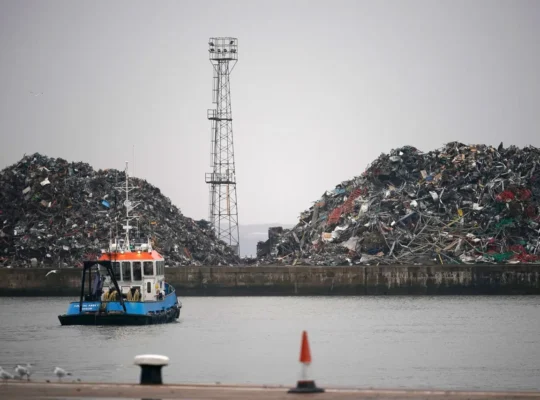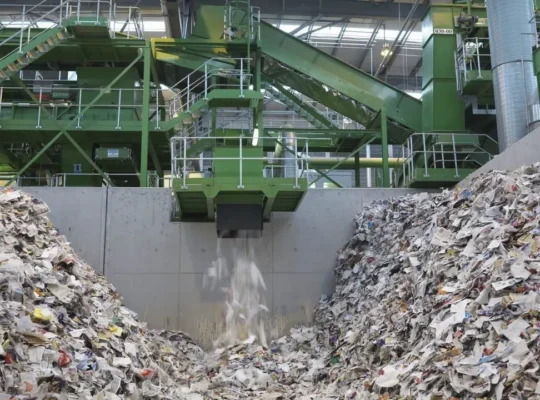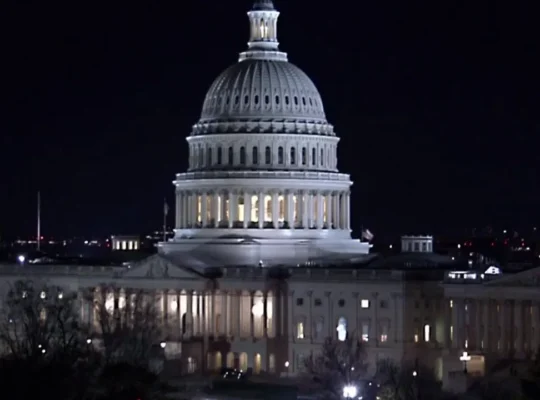
In a confluence of environmental and economic challenges, the United States finds itself at the epicenter of a dual crisis as it grapples with the fallout from China’s decision to halt the import of key recyclable materials. The reverberations of this policy shift have triggered a domino effect, disrupting not only the nation’s waste management infrastructure but also exposing vulnerabilities in its economic relationship with China.

China’s “National Sword” Policy Leaves U.S. Recycling Industry in Crisis
As of January 1, 2023, China’s stringent implementation of the “National Sword” policy, aimed at addressing environmental concerns, has dealt a severe blow to the U.S. recycling industry. The policy has led to a complete cessation of imports of mixed paper, a category encompassing newspapers, magazines, and cardboard, leaving the American recycling sector in disarray.
The sudden stoppage of exports to China has triggered a nationwide crisis, resulting in significant stockpiles of mixed paper materials across the country. This, in turn, has prompted a cascade of challenges for municipalities and recycling facilities struggling to find alternative outlets for these materials.
Local recycling facilities, once heavily reliant on the lucrative Chinese export market, now find themselves at a crossroads. Faced with the abrupt halt in exports, many facilities are grappling with tough decisions. Some have been forced to scale back operations, while others have been left with no choice but to shut their doors altogether. The ramifications extend beyond the facilities themselves, creating a ripple effect that permeates local economies.
The financial strain on the U.S. recycling industry is palpable, with the mounting pressure threatening the viability of recycling as a sustainable waste management solution. The sudden disruption in the export market has left municipalities and recycling facilities scrambling to adapt, raising concerns about the long-term impact on the country’s ability to effectively manage and process recyclable materials.
Industry experts warn that without swift and effective solutions, the consequences could be dire. The once-thriving recycling sector now faces an uncertain future, with stakeholders urgently seeking alternative markets for recycled materials. The need for innovation and investment in domestic recycling infrastructure has become more pressing than ever to mitigate the fallout from China’s “National Sword” policy and secure the future of sustainable waste management in the United States.
Environmental Advocates Are Warning of an Escalating Plastic Pollution Crisis Following The Current Recycling Industry Disarray.

As the U.S. recycling industry grapples with the fallout from China’s “National Sword” policy, environmental advocates are raising alarms about the potential exacerbation of the plastic pollution crisis. Beyond the immediate challenges faced by recycling facilities, the limited outlets for recycling plastics domestically have sparked growing concerns that a substantial portion of these materials may end up in landfills or incinerators, posing a significant threat to the environment and exacerbating climate change.
The abrupt cessation of mixed paper imports to China has forced recycling facilities to divert their attention and resources away from processing plastics, compounding the challenges already faced by the industry. With fewer options for recycling plastics on a large scale, there is a fear that a considerable amount of plastic waste will be diverted to landfills or incineration, both environmentally detrimental methods of disposal.
Environmental advocates emphasize that plastic pollution is a global crisis, and the disruption in the recycling industry could have far-reaching consequences. Plastics that are not properly recycled contribute to pollution in oceans, harm wildlife, and release harmful greenhouse gases when incinerated. The urgency of finding sustainable solutions to manage and reduce plastic waste has never been more apparent.

As stakeholders in the recycling industry seek alternative markets for materials, environmental organizations are calling for increased investment in domestic recycling infrastructure and the development of innovative technologies to process and repurpose plastics. Additionally, there is a growing push for consumers to reduce their reliance on single-use plastics and for policymakers to implement measures that encourage responsible waste management practices.

The confluence of the challenges faced by the recycling industry and the escalating plastic pollution crisis underscores the need for coordinated and immediate action. The repercussions of these developments extend beyond the industry itself, affecting ecosystems, biodiversity, and the long-term health of the planet. As the United States grapples with the evolving landscape of waste management, finding sustainable solutions for plastic recycling emerges as a critical priority for environmental conservation and climate resilience.
Additionally, China’s Recycling Policy Sparks Economic Concerns for the U.S. Dollar and Manufacturing Sector

The ongoing recycling crisis in the United States is not occurring in isolation, as analysts draw attention to a less-discussed but equally critical aspect—the economic pressures on the U.S. dollar resulting from China’s strategic use of recyclable materials. For years, China has been a major importer of these materials, transforming them into low-cost goods that inundated the American market. The sudden disruption in this supply chain has exposed vulnerabilities in the U.S. economy, particularly in trade imbalances and the manufacturing sector.
The influx of inexpensive Chinese products, ranging from packaging materials to consumer goods, has been a longstanding point of contention. Now, as the economic fallout becomes more apparent, policymakers are grappling with the necessity to reassess trade relationships and fortify domestic industries. The absence of a significant export market for recyclables has not only strained American industries but has also raised concerns about job losses and the erosion of the U.S. manufacturing sector.

The strategic use of recyclable materials has played a key role in China’s economic strategy, enabling the country to produce goods at a lower cost and flood international markets, including the United States. The sudden disruption in this supply chain has left the U.S. with a void that extends beyond the recycling industry, impacting the broader economy.
The economic implications are twofold. On one hand, the abrupt halt in recyclable material exports has left recycling facilities and municipalities struggling to find alternative markets, leading to financial strain and industry upheaval. On the other hand, the economic pressures resulting from the disruption in the supply chain highlight the need for the U.S. to reevaluate its economic dependencies and bolster domestic industries.
Policymakers are now faced with the challenging task of navigating the delicate balance between environmental sustainability and economic stability. The recycling crisis has become a catalyst for discussions on reshaping trade relationships, investing in domestic manufacturing, and addressing longstanding concerns about trade imbalances. As the U.S. grapples with the multifaceted challenges stemming from China’s recycling policy, a comprehensive approach that considers both environmental and economic factors will be crucial in shaping the country’s future economic resilience.
U.S. Cities and States Seek Innovative Recycling Solutions and Economic Challenges

In response to the intertwined crises stemming from China’s recycling policy and the economic pressures on the U.S. dollar, some cities and states across the nation are taking proactive steps to explore alternative waste management strategies. Investments in advanced sorting technologies and initiatives aimed at reducing waste are gaining traction as local governments strive to adapt to the changing landscape.

Federal lawmakers are facing increasing pressure to develop policies that not only support the growth of the domestic recycling industry but also encourage innovation in waste management. The urgent need for sustainable solutions has prompted a broader conversation that extends beyond waste management to reshaping trade policies, investing in American manufacturing, and fostering overall sustainability.
Government officials, industry leaders, and environmental advocates are actively engaged in a comprehensive dialogue to navigate these challenges and ensure a resilient and sustainable economic future for the United States. The multifaceted nature of the crises has prompted a reevaluation of environmental and economic policies at various levels of governance.

As U.S. cities and states grapple with the environmental and economic implications of China’s policy shift, the call for collaborative and forward-thinking solutions has never been more urgent. The recycling crisis is not merely a waste management issue—it has become a catalyst for reimagining the nation’s approach to sustainability, trade, and economic resilience.
The ongoing discussions and initiatives underscore the importance of a holistic and integrated approach, wherein environmental considerations are balanced with economic imperatives. The challenges at hand are prompting a collective effort to shape policies that not only address the immediate crisis but also lay the groundwork for a more sustainable and resilient future for the United States





